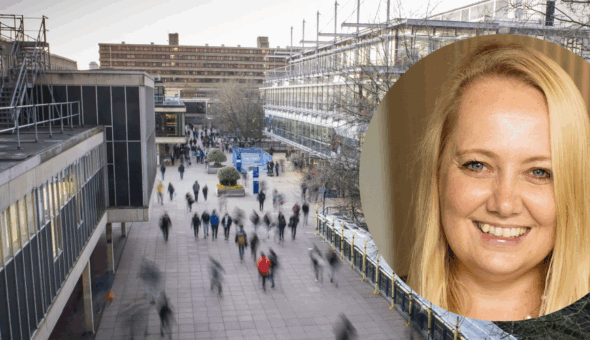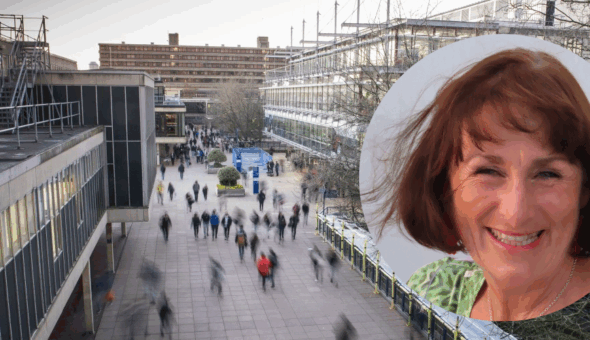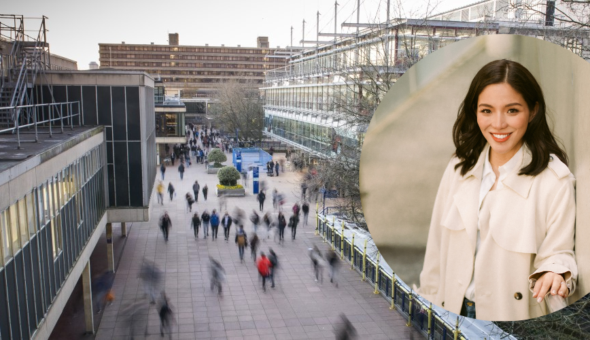Ali attended the University of Bath on a year abroad from the Université Grenoble Alpes in France. He tells us his fond memories as an international student studying computer science, why he threw himself into everything the University could offer – from walking societies to the local pub – and how the University managed to untap a way of thinking he still applies to his career today.
Why did you choose to study at Bath?
I joined the University of Bath as an Erasmus exchange student studying computer science. Bath appealed to me because it had one of the UK's strongest computer science departments – which was definitely a key criterion for me. It also offered a variety of courses which was great because, as an Erasmus student, we had the choice to combine rather freely. Last but not least, I was drawn to the beautiful city that Bath is, with its history and friendliness.
Did you have a particular career in mind when you chose your course?
To be honest, not really! Completing a particular bachelor’s project – which I worked on with a very good friend of mine and fellow Erasmus exchange student – was definitely an eye opener with regards to what one can actually do with computer science.
 The non-technical elements to the courses at Bath, for example on intellectual property or how to measure the financial as well as societal value your ideas, also helped me understand what kind of career could follow.
The non-technical elements to the courses at Bath, for example on intellectual property or how to measure the financial as well as societal value your ideas, also helped me understand what kind of career could follow.
Can you tell us about your experience of studying here?
I remember my first day, when the head of the Department of Computer Science proudly shown us how strong the University of Bath is for computer science, and was praising the excellent students for this achievement.
We took our studies, and the bachelor's degree project, rather seriously. Our thesis included a system for enhanced, real-time social interaction. To increase participation, we posted all around on campus, "Want a free pint of beer? Join us at the library (at a specific date and time) and try out our new software for at least an hour." Tens of motivated students joined and they ended up ‘testing’ for much longer! We of course celebrated all together with more than the promised one pint.
Were you a part of any societies or sports clubs during your time at Bath?
As an international student, discovering was the key interest. I joined a society which involved walking every footpath in the region, making sure to document that we have used the routes at least once a year so they remain open.
It was a great way to get energised in nature, have nice chats and, of course, finding a local pub or two on the way to try out their home-brewed cider.
One of my friends had a connection to the students' union and so, with four other students, we rented out one of the University of Bath SUVs to explore the beautiful and inspiring remote areas of Wales.
What was your experience as an international student studying in the UK? Do you have any advice for others?
The UK and the University of Bath are extremely welcoming and supportive of international students; we were given plenty of pointers way ahead of time so we can settle in well.
One piece of advice I would give is to mingle! My friend and I rented out, with three other local students, a flat close to Oldfield Park, and making these connections made us feel at home. Go out, be open, don't be reserved, enjoy. If you find your English is not good enough, it is because you have not spoken it enough – so go out and meet people!
Describe your career journey since graduating.
I currently work in Switzerland as an IT Director, leading a 24/7 team who look after the sustained operational availability, stability and performance of the entire Swiss Re's IT portfolio. When we look at the aftermath of major IT incidents and how to avoid reoccurrence, good practices from CM30072 (the famous Safety-Critical Computer Systems course from the BSc at the University at Bath) do inspire at times! My job involves managing technology and people, aligned with the corporate strategy and market trends. I still remain hands on with the technology as well, yet only in my private life through open source contributions.
How did your studies help you to develop?
The way courses were taught at Bath, even the ones you would consider as ‘very dry’ (such as the deep theories of calculability and complexity) were taught in a way that expressed the ‘why’ behind the subject matter. This helped a lot in my career as I learnt to not just focus on the ‘what’ but also the ‘why’, which matters more in engaging others and keeping oneself motivated. Moreover, the University environment, fellow students, great societies and, of course, the fantastic support from the University gave me the confidence to be much more courageous in the way I approach things.
What advice would you give to prospective students thinking about studying your course at Bath?
Your time at University is a very unique experience. It can be intense as you are often having to absorb and process many new ideas at once, so surround yourself in the natural environment as it can give you comfort, and at the same time the room to grow and increase in confidence. Try new things; the University of Bath has an enormous variety of subjects taught a stone's throw away from each other making it easy to explore and discover. Do sports; the campus has a very comprehensive sports ground, with great people to guide and motivate you. When you feel lost, try something new, try something innovative, let the great minds at the University inspire you and remain courageous.
Respond



